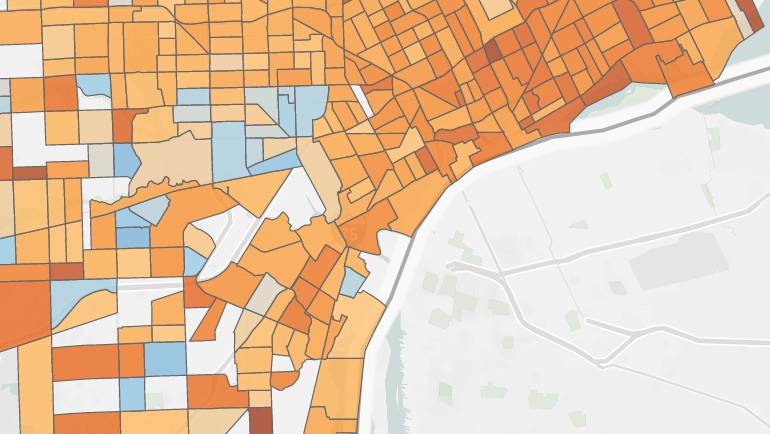Wayne State develops novel geocoded map to improve health outcomes throughout Michigan

If you live in southeast Michigan, your ZIP code may determine how long you live.
Live in the 48236 ZIP of Grosse Pointe and at birth you can expect to live to an average of 82 years. Just a few short miles away, however, if you're born and live in the Detroit ZIP of 48201, you can shave 13 years off that respectable mark.
The 13-year loss can be attributed to numerous factors, including a lack of access to healthy food, health care and safe places to exercise. Resource limitations and socioeconomic disparities in the 48201 ZIP code also contribute to soaring levels of toxic stress and poor health. That stress often manifests in the form of disproportionate levels of high blood pressure, which, if uncontrolled, brings on a host of illness guaranteed to shorten lifespan. That's the bad news.
The good news is that a radically new form of mapping health data by census tract may give policymakers, researchers and health care providers the information they need to design targeted efforts to improve health in areas with a long history of worse outcomes.
The goal, said Phillip Levy, M.D., M.P.H., assistant vice president of Translational Science and Clinical Research Innovation for Wayne State University, is to develop a precision approach to population health, guided by data provided by drilling down as far as possible, perhaps even to individual neighborhoods. Such data can provide policymakers with information to laser-focus efforts for substantial impact where the need is greatest.
Known as PHOENIX, the Population Health OutcomEs aNd Information EXchange, this novel geocoded map will be housed at Wayne State University using de-identified electronic health records in combination with information on population level social determinants to paint an overall picture of health in Michigan area by area, using color-coding to graphically display differences.
"Staying healthy allows people to be vibrant contributors, to family, providing emotional and physical support, and to the tax base, which helps schools and community services, bettering the overall quality of life, and prospects for the future," Dr. Levy said.
Contact info
Julie O'Connor
Director, Research Communications
Phone: 313-577-8845
Email: julie.oconnor@wayne.edu